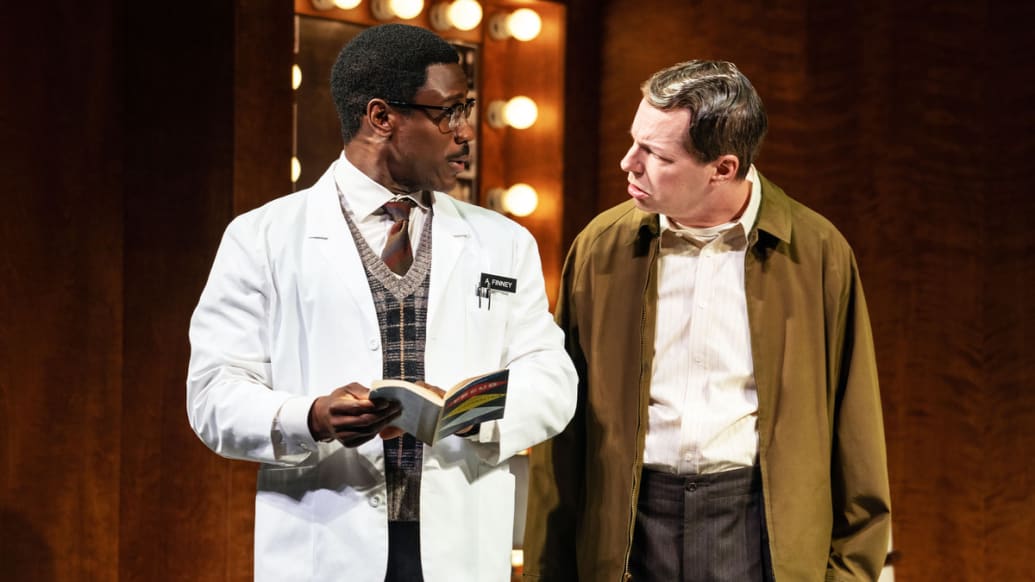As befits its era, Doug Wright’s Good Night, Oscar (Belasco Theater, booking to August 27) is an elegant Broadway play, dressed and furnished with mid-century aplomb. This Goodman Theatre production also feels bravely lost in history, setting itself the task of encouraging audiences to care about someone who is decades past being a household name.
If its subject—the trials, tribulations, and controversy-courting comic brilliance of Oscar Levant—is unfamiliar to those who were not around to watch NBC’s Tonight Show in the 1950’s, then the hope of producers must be that the starriness of Will & Grace star Sean Hayes as Levant will draw the crowds, alongside the perennial theme of when entertainment bleeds into the ugly exploitation of a clearly unwell performer.
Theater-goers should not expect “Just Jack!” when they take their seats. The play, directed by Lisa Peterson, is a very slow, low burn, whose ultimate conflagrations of both humor and music—care of a bravura, piano-playing Hayes—are dazzling. However, the play takes time to locate its drive and punch. For a sludgy opening stretch, Good Night, Oscar—set in two dressing rooms and eventually The Tonight Show studio, all simply and beautifully designed by Rachel Hauck—is mostly plodding exposition.
It is 1958, and the show has decamped to Los Angeles for its rating-grabbing “sweeps” period. Jack Paar (a smoothly sunny Ben Rappaport) has booked Levant for the show, knowing there will be verbal fireworks. Gruff NBC boss Bob Sarnoff (Peter Grosz) is panicky, because of Levant’s (for its era) edginess. Paar is insistent: “Folks are in bed, watching the TV screen through their feet, and Oscar jolts them awake.”
What Sarnoff doesn’t know is that Levant is being sprung from a psychiatric hospital, having dangerously double-dosed on Demerol and Paraldehyde. His wife June (Emily Bergl, subtly steely) has had him committed, and has lied to say that he wants a night away to attend their daughter’s graduation. He is having electro-convulsive therapy. He was unable to sign his own commitment papers, she recalls. “I couldn’t help thinking, ‘Those are the very same fingers that play Debussy and Ravel so beautifully.’” Before the electric shocks, Levant tells his wife, he puts a slice of bread in each pocket. “When they’re done—voilà!—toast for breakfast.”
In the play, Sarnoff is painted as the baddie and fun-killer—fearful of the conservative pressure groups of the day. He is also right; Levant should not be performing in the state he is in. Paar is the ringmaster who wants to make it happen, whatever the cost. Today, host and TV executive would be in feverish unison on the need for ratings—at any cost. Levant does not seem that bothered either way; he feels blown into every situation on unseen gusts of circumstance he has long forfeited control over.
Ben Rappaport as Jack Paar, left, and Sean Hayes as Oscar Levant in ‘Good Night, Oscar.’
Joan Marcus
The supporting cast around Hayes are just that—sounding boards and action and zinger facilitators for Levant. In a recent New York Times interview, Hayes said he had studied Levant’s demeanor and tone, and it is a shock to see how undone Levant’s off-screen persona is. He slurs into the folds of his jowls, he has OCD—stirring his coffee four times clockwise, then anti-clockwise. He is accompanied by a caring but also no-nonsense doctor, Alvin (Marchánt Davis), while Alex Wyse plays Max, a starry-eyed production assistant, excited that an unseen Jayne Mansfield is the evening’s other guest.
The play—with lovely costumes by Emilio Sosa—fires into some kind of life when Hayes/Levant begins to tell his bawdy jokes, showcasing Hayes’ talent to crack and flay juicy punchlines (even if women, in seamy scenarios, were often the butt of Levant’s jokes). Recalling a night with a prostitute named Sadie, Levant says the name was shared with his grandmother. “How am I supposed to make love to you when all I can think of are potato kugel and rosewater?” he tells her. He says he’s had great sessions with a new shrink, only to find out he’s another patient “with delusions of grandeur. Truth is, I got off easy. He told the gals in the women’s ward he was a gynecologist.”
“What does he do for exercise, Paar asks Levant. ‘I stumble, then I fall into a coma.’”
Sarnoff desperately does not want Levant to joke about politics, sex, or religion—a red rag to a comic on a tear. We see some of Levant’s most famous jokes, and the way Hayes tells them exhibits an almost anti-pleasure in their delivery. We see Levant curdled with self-hatred and torment off- and onstage. The jokes feel like arrows that must be dispensed; Levant is in search of targets—to outdo himself in terms of edge and pith—rather than laughs.
What does he do for exercise, Paar asks Levant. “I stumble, then I fall into a coma.” Levant is close friends with God, he says, even if the latter has mood swings: “On the one hand he gives us Mahatma Gandhi and the polio vaccine; on the other Adolf Hitler and cartoon chipmunks that sing. Turns out he was a manic depressive.” And the notorious Arthur Miller/Marilyn Monroe joke, about her converting to Judaism for him. “Now that she’s kosher, he can eat her.”
Levant seems so psychologically and physically damaged by the time we meet him it feels long past time to take us back to the lands of how-did-it-get-so-bad (which isn’t clear). Hayes plays human roadkill with an all-too-believable soul-mangled misery, but the provenance of his terminal decline is too unknown for us to invest in the shell of a person in front of us. Bergl as June does as much as she can to sketch the intriguing land of the Levants’ marriage—and the love, collapse, and eddying control within it—but she is not given much to work with.

Emily Bergl as June Levant, left, and Sean Hayes as Oscar Levant, in ‘Good Night, Oscar.’
Joan Marcus
Central to Levant’s suffering in Good Night, Oscar is his relationship to the music of George Gershwin, which he played on the piano. Strains of “Rhapsody in Blue” leave Levant in a frozen, literally floored state, beset by auditory hallucinations of Gershwin himself (a suavely opaque John Zdrojeski). The lighting changes (by Carolina Ortz Herrera and Ben Stanton) at these moments effectively signal Levant’s descent into an inner madness, but the verbal exchanges between Levant and Gershwin are overlong and bizarre avenues.
Levant loved playing Gershwin on the piano, but it also drove him crazy that none of his own compositions had become as well-known. His acclaimed playing of such classics was a torture for him; Gershwin “showed me the limits of my talent…I couldn’t compete, not with that kinda brilliance,” Levant says. Theirs was “a neurotic love affair.”

Marchánt Davis as Alvin, left, and Sean Hayes as Oscar Levant in ‘Good Night, Oscar.’
Joan Marcus
Having necked another industrial dose of Demerol, it is a love Levant ultimately capitulates to. This is probably to his own detriment if the play is to be believed, yet thankfully in this show because Hayes’ crowning moment in Good Night, Oscar is playing “Rhapsody in Blue” on the piano—a combination of a kind of entranced emotional earthquake and breathtaking technical mastery; maybe a Tony nomination will be attendant on it, or Hayes will perform it on the night.
The play’s postscript features Levant recognizing the depths of his malady, and Sarnoff remarking that if Levant’s degrading of women, “insulting the Jews,” and turning his own psychoses and pain into comedy “augurs the future of television, well then I rue the day.” The audience debases itself by finding such things funny, Sarnoff says.
He may be right, but our audience’s wry murmur at this moment signifies a shared knowledge of exactly where TV—comedy and otherwise—and its audiences have ended up. Today, any TV executive like Sarnoff would relish the controversy and heat, especially during sweeps, that Levant once supplied. In Good Night, Oscar, Levant is a harbinger of pop-culture, for good and ill, to come—and the demons of all kinds that have shaped it.



